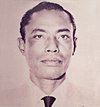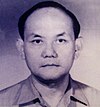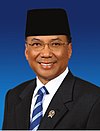| No. | Portrait | Minister | Took office | Left office | Time in office | Party | Cabinet |
|---|
| 1 | | Chaerul Saleh
Minister of Basic Industry and Mining (1959–1964)
Minister of Oil and Natural Gas (1964–1966) | 9 July 1959 (1959-07-09) | 22 February 1966 (1966-02-22) | 5 years, 49 days | | Murba | Working I
(9 July 1959 (1959-07-09) – 18 February 1960 (1960-02-18))
Working II
(18 February 1960 (1960-02-18) – 6 March 1962 (1962-03-06))
Working III
(6 March 1962 (1962-03-06) – 13 November 1963 (1963-11-13))
Working III
(13 November 1963 (1963-11-13) – 27 August 1964 (1964-08-27))
Dwikora I
(27 August 1964 (1964-08-27) – 22 February 1966 (1966-02-22)) |
| 2 | | Armunanto
Minister of Mining | 27 August 1964 (1964-08-27) | 27 March 1966 (1966-03-27) | 1 year, 212 days | | Independent | Dwikora I
(27 August 1964 (1964-08-27) – 22 February 1966 (1966-02-22))
Dwikora II
(22 February 1966 (1966-02-22) – 27 March 1966 (1966-03-27)) |
| 3 | | Ibnu Sutowo
Minister of Oil and Natural Gas | 22 February 1966 (1966-02-22) | 25 July 1966 (1966-07-25) | 149 days | | Independent | Dwikora II
(22 February 1966 (1966-02-22) – 27 March 1966 (1966-03-27))
Dwikora III
(31 March 1966 (1966-03-31) – 25 July 1966 (1966-07-25)) |
| 4 | | Slamet Bratanata
Minister of Mining | 28 July 1966 (1966-07-28) | 11 October 1967 (1967-10-11) | 1 year, 75 days | | Independent | Ampera I
(28 July 1966 (1966-07-28) – 11 October 1967 (1967-10-11)) |
| 5 | | Soemantri Brodjonegoro
Minister of Mining | 17 November 1967 (1967-11-17) | 28 March 1973 (1973-03-28) | 5 years, 131 days | | Independent | Ampera II
(17 November 1967 (1967-11-17) – 10 June 1968 (1968-06-10))
Development I
(10 June 1968 (1968-06-10) – 28 March 1973 (1973-03-28)) |
| 6 | | Mohammad Sadli
Minister of Mining | 28 March 1973 (1973-03-28) | 29 March 1978 (1978-03-29) | 5 years, 1 day | | Independent | Development II
(28 March 1973 (1973-03-28) – 29 March 1978 (1978-03-29)) |
| 7 | | Soebroto
Minister of Mining and Energy | 31 March 1978 (1978-03-31) | 21 March 1988 (1988-03-21) | 9 years, 356 days | | Golongan Karya | Development III
(31 March 1978 (1978-03-31) – 19 March 1983 (1983-03-19))
Development IV
(19 March 1983 (1983-03-19) – 21 March 1988 (1988-03-21)) |
| 8 | | Ginandjar Kartasasmita
Minister of Mining and Energy | 23 March 1988 (1988-03-23) | 17 March 1993 (1993-03-17) | 4 years, 359 days | | Golongan Karya | Development V
(23 March 1988 (1988-03-23) – 17 March 1993 (1993-03-17)) |
| 9 | | Ida Bagus Sudjana
Minister of Mining and Energy | 17 March 1993 (1993-03-17) | 14 March 1998 (1998-03-14) | 4 years, 362 days | | Golongan Karya | Development VI
(17 March 1993 (1993-03-17) – 14 March 1998 (1998-03-14)) |
| 10 | | Kuntoro Mangkusubroto
Minister of Mining and Energy | 14 March 1998 (1998-03-14) | 20 October 1999 (1999-10-20) | 1 years, 118 days | | Golongan Karya | Development VII
(14 March 1998 (1998-03-14) – 21 May 1998 (1998-05-21))
Development Reform
(23 May 1998 (1998-05-23) – 20 October 1999 (1999-10-20)) |
| 11 | | Susilo Bambang Yudhoyono
Minister of Mining and Energy | 29 October 1999 (1999-10-29) | 23 August 2000 (2000-08-23) | 302 days | | Independent | National Unity
(26 October 1999 (1999-10-26) – 23 July 2001 (2001-07-23)) |
| 12 | | Purnomo Yusgiantoro
Minister of Energy and Mineral Resources | 23 August 2000 (2000-08-23) | 20 October 2009 (2009-10-20) | 9 years, 40 days | | Independent | National Unity
(26 October 1999 (1999-10-26) – 23 July 2001 (2001-07-23))
Mutual Assistance
(10 August 1998 (1998-08-10) – 20 October 2004 (2004-10-20))
United Indonesia I
(21 October 2004 (2004-10-21) – 20 October 2009 (2009-10-20)) |
| 13 | | Darwin Zahedy Saleh
Minister of Energy and Mineral Resources | 22 October 2009 (2009-10-22) | 19 October 2011 (2011-10-19) | 1 year, 362 days | | Demokrat | United Indonesia II
(22 October 2009 (2009-10-22) – 20 October 2014 (2014-10-20)) |
| 14 | | Jero Wacik
Minister of Energy and Mineral Resources | 19 October 2011 (2011-10-19) | 5 September 2014 (2014-09-05) | 2 years, 321 days | | Demokrat | United Indonesia II
(22 October 2009 (2009-10-22) – 20 October 2014 (2014-10-20)) |
| — | | Chairul Tanjung
Acting
Minister of Energy and Mineral Resources | 11 September 2014 (2014-09-11) | 20 October 2014 (2014-10-20) | 39 days | | Independent | United Indonesia II
(22 October 2009 (2009-10-22) – 20 October 2014 (2014-10-20)) |
| 15 | | Sudirman Said
Minister of Energy and Mineral Resources | 27 October 2014 (2014-10-27) | 27 July 2016 (2016-07-27) | 1 year, 274 days | | Independent | Working
(27 October 2014 (2014-10-27) – 20 October 2019 (2019-10-20)) |
| 16 | | Arcandra Tahar
Minister of Energy and Mineral Resources | 27 July 2016 (2016-07-27) | 15 August 2016 (2016-08-15) | 19 days | | Independent | Working
(27 October 2014 (2014-10-27) – 20 October 2019 (2019-10-20)) |
| — | | Luhut Binsar Panjaitan
Acting
Minister of Energy and Mineral Resources | 15 August 2016 (2016-08-15) | 14 October 2016 (2016-10-14) | 60 days | | Golongan Karya | Working
(27 October 2014 (2014-10-27) – 20 October 2019 (2019-10-20)) |
| 17 | | Ignasius Jonan
Minister of Energy and Mineral Resources | 14 October 2016 (2016-10-14) | 20 October 2019 (2019-10-20) | 3 years, 6 days | | Independent | Working
(27 October 2014 (2014-10-27) – 20 October 2019 (2019-10-20)) |
| 18 | | Arifin Tasrif
Minister of Energy and Mineral Resources | 23 October 2019 (2019-10-23) | 19 August 2024 (2024-08-19) | 4 years, 301 days | | Independent | Onward Indonesia
(23 October 2019 (2019-10-23) – present) |
| 19 | | Bahlil Lahadalia
Minister of Energy and Mineral Resources | 19 August 2024 (2024-08-19) | incumbent | 202 days | | Golongan Karya | Onward Indonesia
(19 August 2024 (2024-08-19) – present) |
























